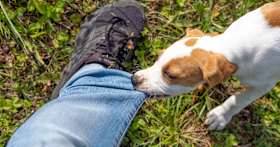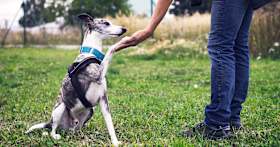What Should You Do if Your Dog Bites Someone?
This is more common than pet parents think, which is why it’s important for them to know their rights and what to do.
This is more common than pet parents think, which is why it’s important for them to know their rights and what to do.
by Kelly Villa, | August 20, 2025

Mark Urrea / iStock
No one ever plans to get bitten by a dog, yet it happens way more often than people think. More than 4.5 million dog bites occur each year in the United States, with animal bites being the second most common reason kids seek medical care.
Dog bites are usually not caused by a dog being “bad” or unpredictable. Dogs typically bite because people are not great at reading canine body language. Pups are constantly telling us how they feel, but when people miss those subtle signals or push past a dog’s comfort zone, that’s when trouble starts.
Here is everything you need to know if your dog bites someone, or if you want to be prepared in case they do.
After a dog bites, safety comes first. When dogs bite, it’s often because the dog is terrified. Taking these steps can help manage the dog’s fear and better prepare you for what to do next, such as reporting the bite (which may be legally required).
To prevent more bites: Remove the dog from the situation to avoid further fear or aggression.
Check on the injured person: Assess the severity of the bite, and determine if they need medical help. If this is a puncture wound, signs of redness or swelling, or the bite was on the hands, face, or feet, it’s best to seek medical attention for antibiotic treatment. Report the dog bite to the doctors, because even small animal bites can become infected.
Collect contact information: If this bite occurred with a stranger, get their contact information along with the information of any witnesses. Take pictures of the bite for your records.
Make note of the situation: Think about what was happening before the bite occurred. This includes your dog’s body language, and what the injured person was doing.
Work with officials: You or the person bitten may be legally required to report the bite. Cooperate with police or animal control officers if they investigate the bite.

Yes, you can. But you must commit to transparency and other ethical considerations when rehoming a dog who’s bitten.
After the incident, figure out their triggers and contact a professional dog behaviorist or trainer to help develop a training plan to get your pet on the right track.
Identify the trigger: A behaviorist or trainer can help you pinpoint the root cause (such as fear, pain, or frustration) of the biting.
Create a safety plan: They can provide you with management tools and strategies to prevent another incident.
Teach body language: A trainer or behaviorist can help you recognize subtle early warning signs before your pup’s reaction escalates.
Build trust again: It may be difficult to have the same level of trust in your dog after a bite. Work with a trainer using positive reinforcement to rebuild that confidence between you and your dog.
Behavior modification: The trainer or behaviorist can provide a step-by-step guide to desensitization and counterconditioning to change how your dog feels about triggers.
Support for you: You’ll also get guidance so you feel safe and in control while training your dog, as well as outside of your classes.
It’s a situation no dog parents ever wants to face: If your dog bites someone, you’ll need to be prepared for what could happen next. Here are a few things to consider.
Each state has different bite laws. Some jurisdictions have a one-bite law, which minimizes or eliminates the pet parent’s liability for a dog who has not previously shown signs of aggression. Other places have strict liability laws that make pet parents fully liable, even if they could not have prevented the incident.
A bite from a dog who was allowed to roam free will carry different consequences than a bite that occurred during, for instance, a break-in. How and why the bite happened will have a major impact on your liability and what will happen to your dog.
Was the dog-bite victim taunting your dog, attacking you, or entering your yard or home without permission? In these cases, comparative negligence laws explain that the victim will share or bear full responsibility for the incident.
If your dog has bitten someone in the past, there is a greater chance you’ll be liable, and in some cases, your dog will be seized and possibly euthanized. Following a dog bite incident, contact a lawyer who specializes in such cases. Even if it’s clear that the victim was at fault, you’ll still need a lawyer to help you navigate the process that is to come.

The one-bite rule holds pet parents responsible only after a dog has bitten once — but not all states follow it. Find out which states do.
The truth is, although you can’t guarantee a dog won’t bite, you can take steps to make it much less likely. Below, a few suggestions.
Socialize your pup so that they are comfortable in a variety of settings, especially with other dogs, people, and kids. This is one way to avoid a situation where your dog bites out of fear or anxiety.
Avoid exposing your dog to their triggers, whether that be other dogs, people, or resources (such as toys and food), without a plan in place to set them up for success.
Observe signs of distress such as tongue flicking, tail tucking, trying to move away, and dilated pupils. These all indicate the dog may be terrified, and not just nervous and should be removed from a situation.
Additional strategies include spaying and neutering your dog and taking a training class with your dog.
“Animal Bites.” Who.int, World Health Organization: WHO, 12 Jan. 2024, www.who.int/news-room/fact-sheets/detail/animal-bites.
Dixon, Cinnamon A et al. “Dog bite prevention: an assessment of child knowledge.” The Journal of pediatrics vol. 160,2 (2012): 337-341.e2. pubmed.ncbi.nlm.nih.gov/21885057.
“Dog and Cat Bites.” Patient.info, patient.info/treatment-medication/dog-and-cat-bites.
Not all dog bites should be treated with antibiotics.” Stanford.edu, 2025, med.stanford.edu/news/insights/2015/02/stanford-study-not-all-dog-bites-should-be-treated-with-antibiotics.html.
Disclaimer: This article is for informational purposes only and isn’t legal advice. If you need guidance for your specific situation, talk to a licensed attorney.

Kelly Villa is a freelance writer and contributor to various pet publications.

Behavior & Training

Behavior & Training

Behavior & Training

Behavior & Training

Behavior & Training

Behavior & Training

Behavior & Training

Behavior & Training
Is your new pup biting everything? Learn effective ways to curb this behavior by teaching bite inhibition.

Behavior & Training
The answer is not so cut-and-dry. Here’s a deep dive into small-dog behavior.